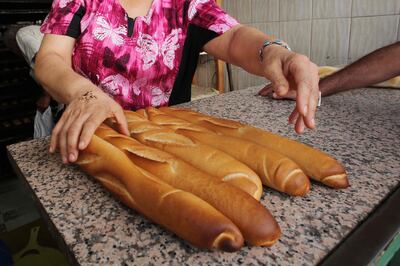Tunisia announced it will resupply flour to more than 1,000 non-subsidised bakeries after most of them ceased operating, government and industry officials said on Sunday.
The deal could help ease a bread shortage that has worsened over the past two weeks.
Since the beginning of August, European-style bakeries selling baguettes in the formerly French-ruled country were prevented from accessing their quota of subsidised flour after President Kais Saied said there should be “one type of bread for all Tunisians”.
Days later, those same bakeries also stopped receiving non-subsidised flour and semolina from the state, which controls the supply of all such essential goods in the country.
The Commerce Ministry said that the decision to cut off subsidised flour allocations came in response to the bakeries’ move to suspend subsidised bread baking as of August 1, in protest at the flour reductions.
Known as “modern bakeries”, the shops sell at a higher price and also offer pastries and other breads. More than 3,500 other bakeries sell only subsidised baguettes at a cost of 190 Tunisian millimes ($0.07), a price unchanged since 1984.
These bakeries, also known as non-classified bakeries, must sell baguettes at the same subsidised price despite having to purchase the semolina and flour from the state for a cost 65.600 Tunisian dinars ($21.25) per 100 kilograms.
Samir Abidi, a modern bakery owner in the town of Mornag in the Ben Arous governorate, part of the larger capital metropolitan area, told The National they had hoped for a more comprehensive reform plan for the sector as a whole, but instead, they were given a temporary solution.
"When the president came out and said that there should be one type of bread for all Tunisian, we hoped he would look at us as well and find us a solution, but instead they resumed supplying us [with flour and semolina] without any noticeable change," Mr Abidi said.
"Supporting us means supporting the citizens ... selling bread with the equation the government is suggesting does not benefit us at all."
Mr Abidi said it is unfair for classified bakeries to receive support from the state in the form of subsidised flour and semolina while modern bakery owners do not but still have to pay the same amount of taxes to the state.
"If they give us only half of the subsidised quantity they give to classified bakeries, we could even start selling baguettes lower than its current price," Mr Abidi said.

“It has been decided to resume the supply of flour and semolina to the non-subsidised bakers from August 19,” the Commerce Ministry said.
It said it would “respect the laws on the production and sale of bread”.
Economists attribute the bread shortage partly to speculation but, more broadly, to the lack of cereals. Tunisia's debt is about 80 per cent of gross domestic product and the country lacks liquidity.
It is unable to buy enough grain on global markets, economists say.
About 200 bakers in Tunis held a sit-in after the subsidy cut. Authorities then also disrupted the supply of regular flour.
Another such protest planned for Monday in Tunis has been cancelled after the government's latest announcement, Salem Badri, president of the Association of Modern Bakeries in the coastal city of Sfax, told AFP.
Ninety per cent of the 1,443 association members, which employed almost 20,000 people, “had to close their doors” as a result of the earlier decision, Mr Badri said, which made bread queues even longer at the other, state-supported outlets.







